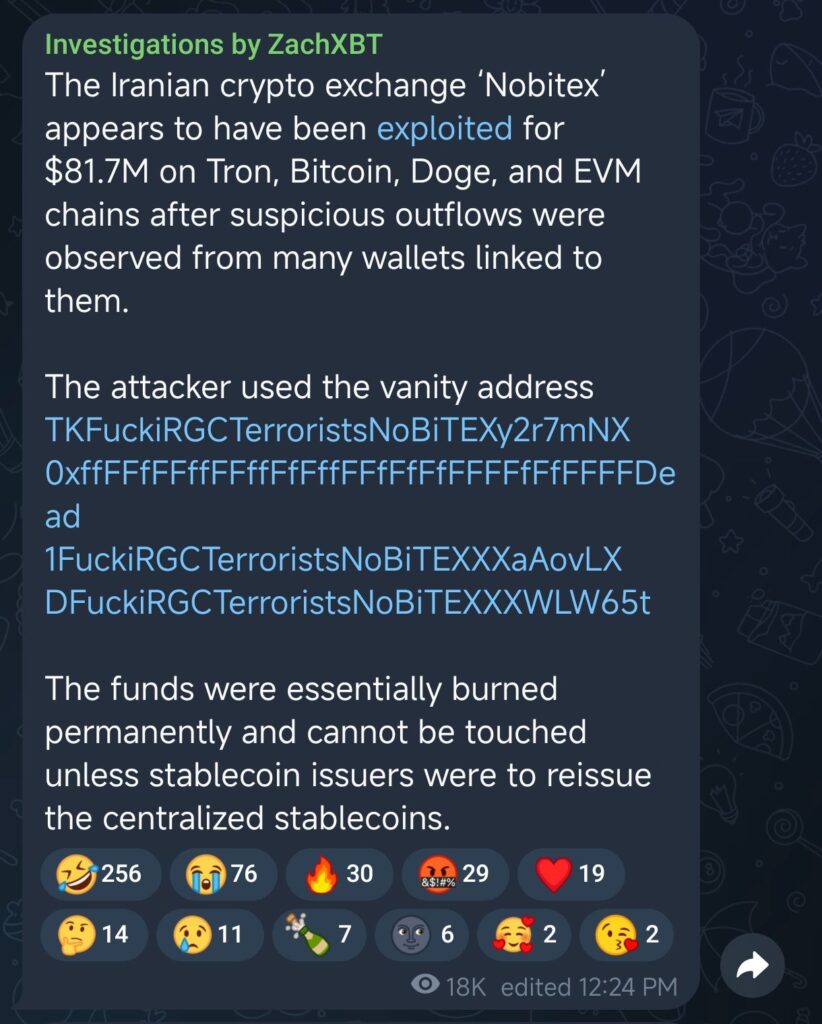

Pro-Israel hackers have stolen $82 million in digital assets from Nobitex, Iran’s largest cryptocurrency exchange, in what analysts describe as a sophisticated cyberattack that highlights the growing intersection of geopolitical tensions and cryptocurrency theft.
The hacker group “Gonjeshke Darande,” whose name translates to “predatory sparrow” in Persian, claimed responsibility for the breach in social media posts Tuesday. Blockchain analyst ZachXBT confirmed the attack and provided details about the stolen funds on the platform Telegram Channel.
The stolen assets include 55 million USDT, a stablecoin pegged to the U.S. dollar, along with 39.41 million Dogecoin valued at approximately $6.72 million, 255.65 billion PEPE tokens worth $2.61 million, and 18.47 Bitcoin valued at roughly $1.94 million, according to blockchain tracking account @lookonchain.
Nobitex serves as a critical financial tool for Iranians navigating international sanctions, facilitating cryptocurrency conversions that allow users to bypass traditional banking restrictions imposed by Western governments.
The attack represents an escalation in cyber operations targeting Iranian financial infrastructure. Gonjeshke Darande previously claimed responsibility for disabling 70% of Iran’s gas stations and attacking Bank Sepah, a financial institution linked to Iran’s military, according to The Times of Israel.
“After the IRGC’s Bank Sepah comes the turn of Nobitex,” the group wrote on X, referring to the Islamic Revolutionary Guard Corps. The hackers stated the attack was part of ongoing efforts to disrupt Iran’s ability to circumvent sanctions.
Iran’s cryptocurrency activity has surged amid economic pressures and geopolitical instability. Chainalysis reported in February that Iran’s crypto outflows reached $4.18 billion in 2024, driven by distrust in the government and international tensions.
Blockchain analysis has proven crucial in tracking the stolen funds. ZachXBT identified specific wallet addresses linked to the attackers, creating a transparent trail of the illicit transactions. The visibility of these addresses could potentially aid law enforcement in freezing the funds, though no official recovery efforts have been announced.


The breach underscores cryptocurrencies’ expanding role in international cyber warfare. TRM Labs estimated Iran’s annual crypto volume at $3 billion in 2022, making the country’s digital asset infrastructure an attractive target for hostile actors.
Nobitex has not issued an official statement regarding the breach, leaving users uncertain about the exchange’s response. The incident has sparked online speculation about potential state-backed involvement, though no concrete evidence supports such claims.
Security experts anticipate increased scrutiny of cryptocurrency exchanges operating in sanctioned regions. While blockchain analysis and international collaboration may help address such breaches, the decentralized nature of cryptocurrencies continues to pose enforcement challenges.
Leave a Comment